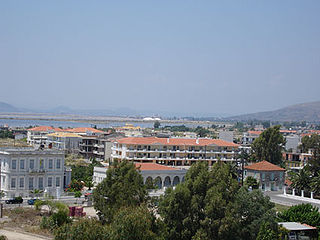
Missolonghi or Mesolongi is a municipality of 32,048 people in western Greece. The town is the capital of Aetolia-Acarnania regional unit, and the seat of the municipality of Iera Polis Mesolongiou. Missolonghi is known as the site of a dramatic siege during the Greek War of Independence, and of the death of poet Lord Byron.

Markos Botsaris was a Souliot chieftain, general of the Greek revolutionary army and hero of the Greek War of Independence. He played a key role in relieving the First Siege of Missolonghi in 1822–1823 and was awarded the title of General of Western Greece by the revolutionary Greek government. He was killed during the Battle of Karpenisi and was buried in Missolonghi with full honors. Today Botsaris is among the most revered national heroes in Greece.
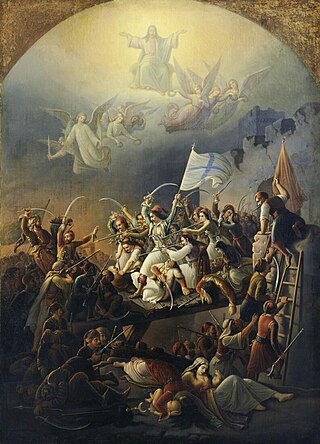
The Third Siege of Missolonghi was fought in the Greek War of Independence, between the Ottoman Empire and the Greek rebels, from 15 April 1825 to 10 April 1826. The Ottomans had already tried and failed to capture the city in 1822 and 1823, but returned in 1825 with a stronger force of infantry and a stronger navy supporting the infantry. The Greeks held out for almost a year before they ran out of food and attempted a mass breakout, which however resulted in a disaster, with the larger part of the Greeks slain. This defeat was a key factor leading to intervention by the Great Powers who, hearing about the atrocities, felt sympathetic to the Greek cause. Their support would prove decisive in helping the Greeks win the war and gain independence.

Georgios Karaiskakis, born Georgios Karaiskos, was a Greek military commander and a leader of the Greek War of Independence.
Mustafa Pasha Bushatli, called Ishkodrali, was a semi-independent Albanian Ottoman statesman, the last hereditary governor of the Pashalik of Scutari. In 1810 he succeeded Ibrahim Bushati and ruled Shkodër until 1831.
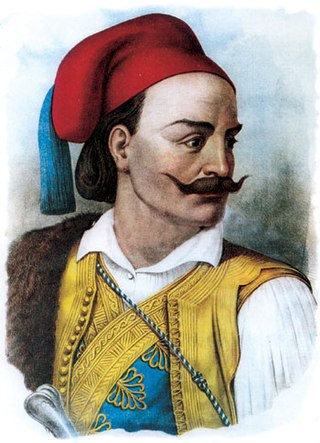
Kitsos Tzavelas was a Albanian fighter and general of the Greek rebels in the Greek War of Independence. After the establishment of the Kingdom of Greece he entered Greek politics and served as Minister of Military Affairs (1847-1848) and as Prime Minister (1847).
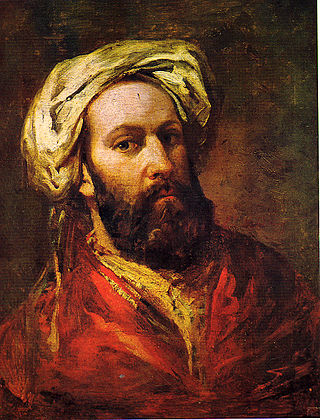
Vizier Omer Pasha Vrioni was an Ottoman Albanian military commander and ruler, and a prominent figure in the Greek War of Independence. He succeeded Ali as Pasha of Yanina.

Anastasios Karatasos was a Greek military commander during the Greek War of Independence was born in the village of Dovras, Imathia and is considered to be the most important revolutionary from Macedonia.
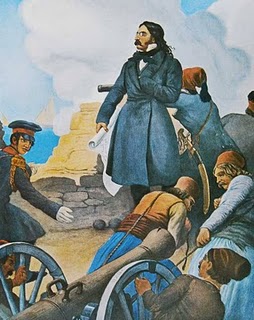
The First Siege of Missolonghi was an attempt by Ottoman forces to capture the strategically located port town of Missolonghi during the early stages of the Greek War of Independence.

The Battle of Vasilika was fought between Greek revolutionaries and the Ottoman Empire during the Greek War of Independence.
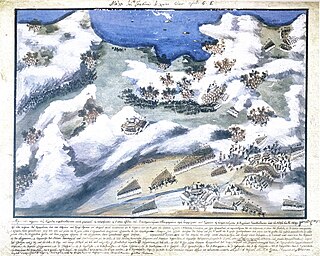
The Battle of Gravia Inn was fought between Greek revolutionaries and the Ottoman Empire during the Greek War of Independence. The Greek leaders Odysseas Androutsos, Yannis Gouras and Angelis Govios, with a group of c. 120 men, repulsed an Ottoman army numbering 8,000 to 9,000 men and artillery under the command of Omer Vrioni and Köse Mehmed. The battle ended with heavy losses for the Ottomans and minimal casualties on the Greek side.
Kitsos Botsaris ; 1741 in Missolonghi – 1813, in Arta), was a leader of the Souliotes, an autonomous community in Ottoman-ruled Epirus. He played a leading role in the aftermath of the last war between the Souliotes and the Ottoman ruler of Ioannina, Ali Pasha. He was the father of Kostas Botsaris and Markos Botsaris, who fought in the Greek War of Independence.
The Battle of Valtetsi was fought on 24 May (N.S.), 1821 in Valtetsi between the Ottoman army and Greek revolutionaries.

The Battle of Doliana occurred on 30 May 1821 N.S. during the Greek War of Independence when Greek revolutionaries defeated the forces of the Ottoman Empire at Doliana in the Morea province of the Ottoman Empire.

The Battle of Peta or Battle of Petta was fought between the Greeks led by Alexandros Mavrokordatos with Markos Botsaris and the Ottomans led by Omer Vrioni on 16 July 1822. The conflict occurred on a hillside near the village of Peta in Epirus.
The Song of Marko Boçari from Suli is an Albanian polyphonic song of the early 19th century, narrating the death of Markos Botsaris, a Souliot leader.
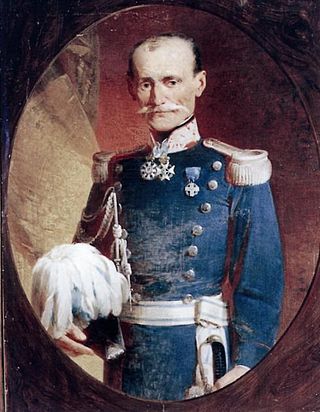
Kostas (Kitsos) Botsaris, also known as Constantine Botzaris, was a Greek general and senator. He was also a captain and a hero of the War of Greek Independence. He fought at the Battle of Karpenisi and completed the victory of his brother, the renowned Markos Botsaris.

The Second Siege of Missolonghi was the second attempt by Ottoman forces to capture the strategically located port town of Missolonghi during the third year of the Greek War of Independence (1823). The second siege is usually ignored however, and the name is often applied to the greater siege of 1825–1826.

The Souliotes were an Orthodox Christian Albanian tribal community in the area of Souli in Epirus from the 16th century to the beginning of the 19th century, who via their participation in the Greek War of Independence came to identify with the Greek nation.

Konstantinos Vlachopoulos was an armatolos, army leader of the Greek War of Independence and the first Greek commander of the Greek Royal Gendarmerie. He was also a member of the Filiki Eteria, a secret organization whose purpose was to overthrow the Ottoman rule of Greece and establish an independent Greek state.

















